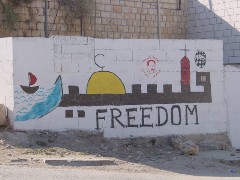 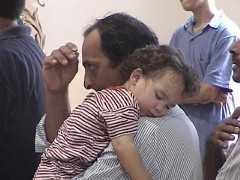 The
sounds of Zababdeh: The
sounds of Zababdeh:
3:00 AM, Rooster (3 sec.) 3:00 AM, Dogs 4:45 AM, Muslim prayer (40 sec.) 6:00 AM, Church bells (40 sec.) 7:30 AM, National Anthem (40 sec.) 18 hrs./day, Generator (5 sec.) |
|
Thursday, 8/22/02: A long, strange trip (theme music courtesy of the Grateful Dead - 5 sec.) which could have been far more eventful given our start on Wednesday in Boston - apparently, we had cancelled our tickets without knowing it. A little bit of bellyaching convinced them otherwise, and after a twelve-hour layover in Amsterdam (enough time to enjoy the Van Gogh Museum - and sneak some shut-eye in their cafeteria), we arrived in Amman at 3:00 in the morning. We made our way (eventually) to the Allenby/King Hussein Bridge to cross into the West Bank. We had been reading about the numbers of International Solidarity Movement folks whose non-violent activities coordinated between Israelis and Palestinians had brought unfavorable attention on the Israeli military's tactics - enough so that many of them (as well as development, relief, and human rights workers) have been turned away by Israeli security at the borders. And so, as always, we approached the bridge with some trepidation - needlessly, it turned out. Our biggest problem was the giggling security girls who pulled us aside and asked us a few questions - they spent most of those few minutes being embarrassed about their halting English. "What do you do here?" "I am a priest." (the nuanced differences between priest and pastor are lost on non-native speakers) "You don't have a church in America?" (too much detail to go into, reminder to pick battles) "No." (some giggles) And so it went. We shared a taxi to Jerusalem with an American family whose roots are in Ramallah, back for a visit - though probably not to Ramallah, which has been under constant curfew for a while now. 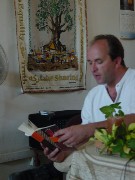 We
checked into our favorite youth hostel, bustling with ISM folks, and begging
for a short story to be written about it - the French woman decorating
her hands and arms with henna for hours on end, the Japanese peace activist
monk who has spent the last ten years in this place walking everywhere
- a few weeks ago, from Jenin (in the northern West Bank) to Eilat (in
the south, by the Red Sea). We made it just in time to the lecture
we hoped to attend at Sabeel Theological Center. British author William
Dalrymple spoke about the writing of his book From the Holy Mountain,
an account of his 1994 travels in the footsteps of a sixth century pilgrim
named St. John Moschos who traveled through what's now Turkey, Syria, Lebanon,
Israel/Palestine, and Egypt. A thoroughly Christian region, the Middle
East in Moschos's time supported thriving monasteries, churches, and
holy sites. Fifteen centuries later, the landscape is very different, shaped
notably by the rise of Islam and, centuries later, the rise in nationalism.
From
the Holy Mountain illustrates forlorn Christian sites in Turkey, that
land of Saint Paul's ministry, whose nationalistic Young Turk movement
cleansed the country of its significant Christian population during the
Armenian genocide in 1915. It brings us to Mar Saba in the desert hills
outside Bethlehem, inhabited by a few salty, opinionated monks clinging
to their ancient tradition (and, in one case, odd opinions about freemasons).
We end in Egypt, where monasticism is experiencing a renaissance; Pope
Shenudah I of the Coptic Orthodox Church even has encouraged a revival
of solitary hermeticism, reminiscent of the Desert Fathers during the first
several centuries after Christ. The account is alternately uplifting and
(more often) distressing, but always fascinating and entertaining, and
we were wowed by the chance to meet and hear its author. We
checked into our favorite youth hostel, bustling with ISM folks, and begging
for a short story to be written about it - the French woman decorating
her hands and arms with henna for hours on end, the Japanese peace activist
monk who has spent the last ten years in this place walking everywhere
- a few weeks ago, from Jenin (in the northern West Bank) to Eilat (in
the south, by the Red Sea). We made it just in time to the lecture
we hoped to attend at Sabeel Theological Center. British author William
Dalrymple spoke about the writing of his book From the Holy Mountain,
an account of his 1994 travels in the footsteps of a sixth century pilgrim
named St. John Moschos who traveled through what's now Turkey, Syria, Lebanon,
Israel/Palestine, and Egypt. A thoroughly Christian region, the Middle
East in Moschos's time supported thriving monasteries, churches, and
holy sites. Fifteen centuries later, the landscape is very different, shaped
notably by the rise of Islam and, centuries later, the rise in nationalism.
From
the Holy Mountain illustrates forlorn Christian sites in Turkey, that
land of Saint Paul's ministry, whose nationalistic Young Turk movement
cleansed the country of its significant Christian population during the
Armenian genocide in 1915. It brings us to Mar Saba in the desert hills
outside Bethlehem, inhabited by a few salty, opinionated monks clinging
to their ancient tradition (and, in one case, odd opinions about freemasons).
We end in Egypt, where monasticism is experiencing a renaissance; Pope
Shenudah I of the Coptic Orthodox Church even has encouraged a revival
of solitary hermeticism, reminiscent of the Desert Fathers during the first
several centuries after Christ. The account is alternately uplifting and
(more often) distressing, but always fascinating and entertaining, and
we were wowed by the chance to meet and hear its author. |
|
Friday, 8/23/02: After a mediocre night's sleep (our poor bodies - they are so confused!) we headed up, eight bags in tow, to the Qalandia checkpoint to find a taxi to Jenin. When we first arrived two years ago, there was a bus and several taxis going every day from Zababdeh to Jerusalem and back. The checkpoints have put an end to that, as have the lack of jobs in Jerusalem (usually in the tourist industry) and the danger to Palestinians who might try and sneak across anyway. Even so, even now a taxi or two go almost every day from Zababdeh to Qalandia, which offers people the option: a checkpoint to the north into Ramallah or a checkpoint to the south into Jerusalem. As our luck would have it, no such drivers were going today (business is always light on Fridays). But we walked a bit, each with a frame pack on the back, day pack on front, and two more bags hung or dragged in tow (we were certainly wondering why we decided to bring so many books back with us). Fortunately, after not too long, we found a taxi going to Jenin, which only took an hour and fifteen minutes to fill up. But we made good use of the time, chatting with an English teacher from nearby 'Aqaba. He and his daughter had accompanied his aged mother to Jerusalem for her eye surgery and were now returning home. Our taxi driver was adept at avoiding some checkpoints by taking routes (the term "roads" cannot apply) across barren arid land. Part of the way up the Jordan Valley road, we were pulled over by an impromptu Israeli checkpoint. One officer took all of our IDs, asked each of the Palestinian men what they did for a living (one teacher, one laborer, and one unemployed) and phoned them in. Another soldier came up and practiced his English with us - "what are you doing with these people?" Marthame: "Just riding in a taxi." Soldier: "When I looked at you, I thought, 'what is he doing, traveling with these Arabs, these terrorists, these f***ing animals. They are just f***ing animals - do you know what I mean?'" (dramatic pause, as Marthame contemplates the best strategy at this point...) Marthame: "You know, most people wouldn't talk that way to a priest." Soldier: "You're right. I guess it's like talking to a rabbi." Marthame: "Exactly." Soldier: "But you know, life is like a box of chocolates. Forrest Gump. Did you see it? What do you think?" Surreal is just the tip of the iceberg here. As he walked away, the English teacher behind us offered his analysis. "He seems scared. This is why he talks this way." A few minutes later, another soldier handed back our IDs and motioned for us to go, then thought twice and pulled us over again. "You, in the front seat, come here." Slowly, the young unemployed man got out of the van and approached the four soldiers. "You, teacher, come here." Our new friend followed suite. (in English) Soldier: "Tell Mundir that we know he has been in prison, so he might as well confess." Teacher: "You seem to know Arabic well. I don't think you need me." Soldier: "If you don't tell him, we know what to do with you." Arabic followed, the man again denied ever having been in prison, and eventually we were all allowed to go - you can literally feel the tension leave the taxi when it pulls away from a checkpoint. Cigarettes usually emerge, too, as part of a collective nicotine sigh. As we approached the next checkpoint, our taxi driver turned off into the desert - one harangue limit per day - and suddenly we found ourselves squeezing the van under a dry aquaduct. With several furtive looks in all directions, the driver pulled the vehicle around and got us back up on the road, some distance past the checkpoint, and we were on our way. The final detour for the day, followed by one more checkpoint, and we were home. We were greeted by good news for a change - our good friend Firas who has been on the road to ordination in the Melkite Church for about eight years is, in fact, going to be ordained a deacon on Saturday! In other words, a land which has been closing churches due to emigration will be re-opening one. Amazing. With this news, it feels like we've participated in something concrete. |
|
Saturday, 8/24/02: It was wonderful to walk through town today - smiling faces, warm handshakes, and kisses greeted us. It really is home in many ways. And this was just on our way to school for the last teacher planning day. We tried to catch up on everyone's news - one marriage, a few babies, neighbor's house blown up, round-the-clock curfews, military detentions (including one of Marthame's former religion students) and arrests - you know, the usual summer news. There are also two new teachers in our midst. 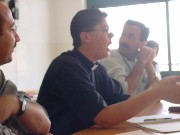 We
gathered close to noon so that Father Aktham could talk to us. After
welcoming everyone, he talked about the challenges that lay before us collectively
this year. Last year was hard. Very
hard. And very unpredictable. As far as anyone can plan for
this year, we can anticipate that it'll be more difficult - possible closures,
absences, etc. - there was a general nod of resignation and dedication
to the task ahead. He then mentioned the two of us in particular
and asked us to say a few words to the teachers about our summer.
Before we could begin, one of the teacher's asked: what do Americans think
about the situation here? (The number one question we get from folks
after our return) This gave us the opportunity to talk about exactly what
we had been up to over the past two months. We brought the two interviews
we had done (one in Lubbock, one in
Atlanta),
the huge butcher-paper Prayer-Gram children in Park
Ridge, Illinois, had created for us (with encouraging messages and
pictures added by other churches we visited), and pictures from our travels.
As we explained, Americans come with a variety of assumptions (or none
at all) to the situation here. Part of our job is to give Westerners
a fuller picture of life here through our lives and experiences.
Particularly, when it comes to the School, a place where Christians and
Muslims work and learn together is particularly prophetic (and hopeful)
to a Western audience. Later on, one of the teachers from Tubas approached
Elizabeth. "You know," she said, "I used to think that all Americans
hated us. Thank you for showing us that not all Americans think the
same." What's amazing is to realize that there are probably others
who think and feel the same, especially when we've known nothing but unconditional
welcome here. Humbling to say the least. In the evening, we
went up to the Arab-American University of
Jenin to reconnect with a friend and hear news from there. As
we drove back down to Zababdeh, we noticed something - the absence of something
- no lights at the Israeli training camp on the outskirts of town.
How odd...Have they finally left, after it's been discussed for five years? We
gathered close to noon so that Father Aktham could talk to us. After
welcoming everyone, he talked about the challenges that lay before us collectively
this year. Last year was hard. Very
hard. And very unpredictable. As far as anyone can plan for
this year, we can anticipate that it'll be more difficult - possible closures,
absences, etc. - there was a general nod of resignation and dedication
to the task ahead. He then mentioned the two of us in particular
and asked us to say a few words to the teachers about our summer.
Before we could begin, one of the teacher's asked: what do Americans think
about the situation here? (The number one question we get from folks
after our return) This gave us the opportunity to talk about exactly what
we had been up to over the past two months. We brought the two interviews
we had done (one in Lubbock, one in
Atlanta),
the huge butcher-paper Prayer-Gram children in Park
Ridge, Illinois, had created for us (with encouraging messages and
pictures added by other churches we visited), and pictures from our travels.
As we explained, Americans come with a variety of assumptions (or none
at all) to the situation here. Part of our job is to give Westerners
a fuller picture of life here through our lives and experiences.
Particularly, when it comes to the School, a place where Christians and
Muslims work and learn together is particularly prophetic (and hopeful)
to a Western audience. Later on, one of the teachers from Tubas approached
Elizabeth. "You know," she said, "I used to think that all Americans
hated us. Thank you for showing us that not all Americans think the
same." What's amazing is to realize that there are probably others
who think and feel the same, especially when we've known nothing but unconditional
welcome here. Humbling to say the least. In the evening, we
went up to the Arab-American University of
Jenin to reconnect with a friend and hear news from there. As
we drove back down to Zababdeh, we noticed something - the absence of something
- no lights at the Israeli training camp on the outskirts of town.
How odd...Have they finally left, after it's been discussed for five years? |
|
Sunday, 8/25/02: Sunday - our first Sunday back, but jet lag is still overpowering. Marthame slept in (not having slept at all last night) while Elizabeth went to worship at the Latin Church of Visitation. Our Melkite friend Firas was assisting Fr. Aktham in the service, and Fr. Aktham announced Firas' upcoming ordination. The service will be next Saturday in the Latin Church because the Melkite church, abandoned for seventeen years, is in no shape for services. The Melkites (Greek Catholic) have much in common with the Greek Orthodox in liturgy, but they are a part of the Catholic communion, acknowledging the Pope of Rome as their head. And so it makes sense for the Latin church should host Firas' ordination. After church, Elizabeth went with many of the ladies to "coffee hour" with the Rosary Sisters (men have their coffee fellowship in the church hall). While Sister Elba (new last year) has stayed in Zababdeh, Sister Aimee and Sister Flavia were transferred to other convents. To replace them, Sister Nadia, an Egyptian, arrived from Jerusalem, and Sister Isabel, a Palestinian, came from the Galilee. It was nice to gather with the nuns and ladies and chat (and have them, too, ask what Americans think of the situation). Later, back at the ranch, we're still cleaning all of the collected summer dust off of our furniture (and the collected summer exhaustion from our eyes). |
|
Monday, 8/26/02: The first day of school. The usual chaos of school was compounded by what we anticipated - unpredictability due to the sieges in the area. Usual chaos: for some reason, the school here begins one week earlier than all of the other schools in Palestine. As a result, a few teachers are always absent, as there is teacher training in Tubas, organized by by the Palestinian Ministry of Education. Also, the school schedule and attendance is in flux for the first few days. Plus, the village electrical generator is off from 3 AM to 8 AM - school, and assembly, begins at 7:30. Oh, well. Unpredictability: light student load from Tubas - perhaps just today, perhaps for the rest of the year. Also, the buses from Qabatiya and Jenin arrived late - it's not clear why. The situation in Jenin for the past few weeks has been that the Palestinian police patrol during the day, but at night the Israeli military enters, imposes a curfew at 8:00 PM, and tanks and soldiers begin their patrols. Every night brings shootings and detentions. This means that Sharon is still defying Bush's "I said what I mean and I mean what I said" from April - as well as the UN Security Council Resolution that accompanied it. "We're used to it," said one of the Jenin teachers, with a "what can we do?" shrug. Elizabeth started up with her English classes - grades 7 and 8. Marthame's religion classes haven't begun, but his subbing has - today, grades 3 and 4. On the playground at assembly this morning, one of Elizabeth's students passed out - apparently from the heat, but it was hard to reassure the students. It was two years ago that another young student collapsed on the playground before assembly, a soccer ball hitting him in the chest. Because of the hole in his heart, he quickly died. It's not a moment many of us will soon forget. Fortunately today, there was nothing so frightening; the boy came to and was a bit shaken but fine. In the evening, we visited with Father Thomas, the Orthodox priest, who is our neighbor. We brought him news of our travels - he was most anxious to learn what American Christians think about Eastern Christians. Another opportunity to talk about what we experienced this summer. He and his family shared some of their grapes with us, as well as the usual coffee. Enjoying the cool breeze on his roof (which doubles as their bedroom in the summer), we could hear the distant thuds of tank shells in Jenin. Soon, we also heard the familiar sound of an Israeli jeep on the main road, accompanied by gunfire - both soon passed, thankfully. We learned from them that the Israeli military camp was abandoned as of about a month ago. Since then, people from Qabatiya came in and basically stripped the place - electrical generators, beds, etc. This is the first time since the Jordanians arrived in the 1948 war that the camp has been empty. A church re-opened, a military camp evacuated, could it be that good things are happening here? |
|
Tuesday, 8/27/02: The usual chaos continues. As does teacher training in Tubas. More kids from nearby villages arrived today, perhaps signalling a bit of hope. Marthame's religion classes began today. The tenth grade's numbers are boosted by three students returned from the Latin Seminary in Beit Jala - the situation in that village is currently so untenable that the Seminary is closed and all of the students have returned home to their villages for the year. They will re-evaluate at the end of the year, and hopefully re-open (but no one knows at this point). Temporarily, this means very bright kids will strengthen their classes by their presence. We visited with a friend of ours and his family - he had spent part of the summer in the States visiting some of his family as well as looking for ways to emigrate. "We are not living here," is his constant - and not inaccurate - refrain. His family will be one of those on whom we will focus as we work on a film project, chronicling Christian life in the Northern West Bank. In this area, they have family connections to much of the remnant Christian community - Zababdeh, Tubas, Burqin - as well as significant parts of the Palestinian story - refugees, work in Israel, desire for emigration, the Palestinian diaspora. The priests here are excited by the possibility of sharing the life of the Church in the northern West Bank more fully with the West. Father Aktham has given us his digital video camera on extended loan for the project, and we hope to interest a Stateside partner church or two in adopting the project. As the American sabre rattles against Iraq, people here grow nervous. Reports have appeared in the Israeli newspaper Ha'aretz that Sharon will use an attack on Iraq to begin his not-so-secret project of "transfer" - the ethnic-cleansing of Palestinians from the West Bank. Blessed are the peacemakers... |
|
Wednesday, 8/28/02: In an unprecedented move, the school schedule seems to be set for the year already. Can it be? Only three days? Training continues, though, so Marthame continued to sub. After school, two American nationals arrived from Jerusalem. Connected with Sabeel, they came today to discuss the possibility of a project for Zababdeh. They had little problem, if any, traveling here. Since the camp has been abandoned, the road that passes it has been opened, making commuting time much shorter from Qabatiya (and, by extension, Jenin - when the city is open) to Zababdeh. Not as good as it was two years ago, but certainly a welcome step in the right direction. Marthame talked by phone with Father Hossam, the Anglican priest for Zababdeh and Nablus, who had recently returned from his wedding in Jordan. Weddings are traditionally in the town of the bride, but they could not plan their wedding in Nablus because his family are Palestinian Israelis in the Galilee, and entry of Israelis (except soldiers and settlers) into the West Bank is often prohibited. They could not have the wedding in his town because she and her family are West Bank Palestinans, and consequently forbidden entry to Israel (with few exceptions). And so, to great expense, they had to bring both of their families to Jordan to have the ceremony. Father Hossam's connections with the Anglican hospital in Nablus meant that he and his new wife could travel back into town via ambulance (one of the few vehicles allowed transit. The town is under constant curfew, and has been with few exceptions for nearly two months - the last time Father Hossam was in Zababdeh was not long after we left in June. One thing that struck us when we were in the States was that people didn't understand what curfew means here. At one of our talks someone pointed out that most of us Americans hear that word and recall parents asserting, "You must be home by ten." Right now, the situation in Jenin is somewhat comparable, in a sense - people are free to move about in the day and must be in at night. On the contrary, Nablus, Hebron, and other towns, curfew means it is forbidden to leave home at all - for days on end, often lifted for a few hours and reinstated for however long the military wants. It means no school, no work, no hospital, no food. The poverty and hunger are getting desperate, particularly in the Old City of Nablus. Our Dutch friend who lives and works there recently left (to the city's edge by ambulance, of course), then walking with her luggage over destroyed roads for several miles. Because of the curfew, the usually busy (pedestrian) travel down to Beidan was non-existent, meaning that she was virtually by herself. Frightening when you consider that the area is a closed military zone. She's headed to Holland for some well-deserved vacation. Sounds nice...wait, we just got back! |
|
Thursday, 8/29/02: Marthame subbed for the teacher who was finishing up his training in nearby Tubas. In the afternoon, the new foreign teachers from the University came down for their annual informal tour of the village. There were many fewer this year than in the past two years. The University has so far done a valiant job of staying open amid a hopeless time - we hope thay are able to stay open and attract the needed faculty to keep this lifeline of education and employment open. We took them around to see the churches and the mosque, as well as important places like where to buy the best hummos and the most convenient place for cellphones. We then gathered for some relaxed fellowship and a barbeque back at our place - it's good to get the rust out of the old BBQ skills and grills. |
|
Friday, 8/30/02: Today we began work on our long-term project, a film on Christian life in the Northern West Bank. We went 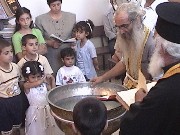 down
to Tubas, a nearby village with a population
of 13-14,000, sixty of whom belong to the Greek Orthodox down
to Tubas, a nearby village with a population
of 13-14,000, sixty of whom belong to the Greek Orthodox 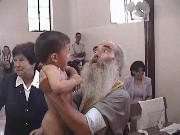 Church
of the Holy Trinity. We have visited with them and gotten to know
them several times before, but each time we go we learn a bit more about
the different communities around here. The Christians of Tubas are
not a remnant community of ancient Tubasi Byzantine Christians (though
there are ruins of older churches among the ruins of "Old Tubas" nearby).
Rather, they are transplants from some of the villages in the area which
were once entirely Christian - Sebastya, Burqa, and others - who over the
centuries moved to either Nablus or Tubas, large commercial centers, as
numbers dwindled back home. In 1976, a new church was built in Tubas
and they recently completed a new church hall as well as a church library.
They estimate that, for the 60 Christians living in Tubas, there are 300-some
living outside Palestine. Today in Tubas was special for two reasons:
the first was the baptism which we were invited to attend, and which we
hoped to film - it was the second Orthodox
baptism we'd seen, an elaborate affair where the child is stripped
naked, anointed, and then dunked into the water three times to symbolize
Christ's three days in the tomb (Paul's reference to being buried with
Christ in baptism is part of the liturgy). Church
of the Holy Trinity. We have visited with them and gotten to know
them several times before, but each time we go we learn a bit more about
the different communities around here. The Christians of Tubas are
not a remnant community of ancient Tubasi Byzantine Christians (though
there are ruins of older churches among the ruins of "Old Tubas" nearby).
Rather, they are transplants from some of the villages in the area which
were once entirely Christian - Sebastya, Burqa, and others - who over the
centuries moved to either Nablus or Tubas, large commercial centers, as
numbers dwindled back home. In 1976, a new church was built in Tubas
and they recently completed a new church hall as well as a church library.
They estimate that, for the 60 Christians living in Tubas, there are 300-some
living outside Palestine. Today in Tubas was special for two reasons:
the first was the baptism which we were invited to attend, and which we
hoped to film - it was the second Orthodox
baptism we'd seen, an elaborate affair where the child is stripped
naked, anointed, and then dunked into the water three times to symbolize
Christ's three days in the tomb (Paul's reference to being buried with
Christ in baptism is part of the liturgy). 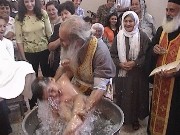 The
second was the presence of Fr. Justinus, the Greek priest The
second was the presence of Fr. Justinus, the Greek priest 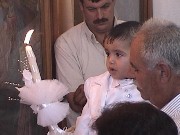 who
is responsible for building the Greek Orthodox Cathedral of Jacob's
Well in Nablus. He has, at different times, served as an "interim
priest" in various villages in the area - including Tubas and Zababdeh.
Because of the baptism he came today, breaking the curfew in Nablus to
do so. A Greek citizen, and clearly a priest (long whispy grey hair and
white beard flowing down over his black robes), he has less fear of being
shot for breaking curfew than other Nablus residents. He and Fr. Thomas
from Zababdeh shared worship leadership duties. Following the baptism
was the typical meal of mansaaf, a hot dish of rice, meat, and delicious
yogurt sauce. Many others came from Zababdeh for the celebration.
Between the weekly prayers and the baptism, we spoke to the church about
what we had been doing that summer, visiting churches in the US and telling
them about the "salt of the earth," the minority Christian community.
We told them that we hoped we could learn from them how to be "salt of
the earth" in the US, a small minority who know the situation endured by
Palestinian Christians but have a wider impact on American attitudes.
We then went out to the Naim Khader Center on the outskirts of Zababdeh
to hear Dr. Mustafa Barghouti
speak. He is one of the Palestinians who is often on TV and who
is responsible for building the Greek Orthodox Cathedral of Jacob's
Well in Nablus. He has, at different times, served as an "interim
priest" in various villages in the area - including Tubas and Zababdeh.
Because of the baptism he came today, breaking the curfew in Nablus to
do so. A Greek citizen, and clearly a priest (long whispy grey hair and
white beard flowing down over his black robes), he has less fear of being
shot for breaking curfew than other Nablus residents. He and Fr. Thomas
from Zababdeh shared worship leadership duties. Following the baptism
was the typical meal of mansaaf, a hot dish of rice, meat, and delicious
yogurt sauce. Many others came from Zababdeh for the celebration.
Between the weekly prayers and the baptism, we spoke to the church about
what we had been doing that summer, visiting churches in the US and telling
them about the "salt of the earth," the minority Christian community.
We told them that we hoped we could learn from them how to be "salt of
the earth" in the US, a small minority who know the situation endured by
Palestinian Christians but have a wider impact on American attitudes.
We then went out to the Naim Khader Center on the outskirts of Zababdeh
to hear Dr. Mustafa Barghouti
speak. He is one of the Palestinians who is often on TV and 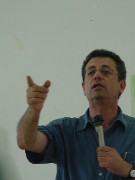 interviewed
on the radio, a brilliant intellectual and a great spokesman with great
personal integrity. He is making the rounds, drumming up support
for a Palestinian National Initiative that folks like he and Edward Said
are involved in. The idea is not to repeat the mistakes of Oslo,
nor the corruption of the PA, but to encourage a Palestinian people's movement
which will seek to define itself separate of a negotiation strategy.
"To be, or not to be", he began. His honesty and directness are well-respected,
but he doesn't have the symbolic stature of Arafat. We couldn't help
but hope that what we attended today was the beginning stages of something
powerful in the making. Hope against hope... interviewed
on the radio, a brilliant intellectual and a great spokesman with great
personal integrity. He is making the rounds, drumming up support
for a Palestinian National Initiative that folks like he and Edward Said
are involved in. The idea is not to repeat the mistakes of Oslo,
nor the corruption of the PA, but to encourage a Palestinian people's movement
which will seek to define itself separate of a negotiation strategy.
"To be, or not to be", he began. His honesty and directness are well-respected,
but he doesn't have the symbolic stature of Arafat. We couldn't help
but hope that what we attended today was the beginning stages of something
powerful in the making. Hope against hope... |
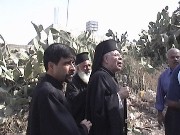 Saturday,
8/31/02: The day we have waited for for two years, and the day
our friend Firas has waited for for eight years: his Saturday,
8/31/02: The day we have waited for for two years, and the day
our friend Firas has waited for for eight years: his 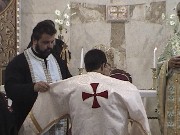 ordination
as a deacon (the step before priesthood) in the Melkite
Church of Zababdeh. For seventeen years, the church has been
vacant, ever since Firas' grandfather died. In the intervening years,
it fell between two bishops' responsibilities as well as what some have
called neglect of the Northern West Bank communities by the church hierarchies.
The Melkite Bishop of Haifa along with
his entourage of priests arrived today to rectify that history, where the
small Melkite community is recognized for their uniqueness rather than
farmed out to the responsibilities of either the Roman Catholic or Greek
Orthodox parishes. They first arrived to visit the Melkite convent,
which Firas has been diligently cleaning for weeks now. Two decades
of neglect have left the place in great disrepair, and so Firas has had
to clean up from the Palestinian police who had taken refuge in there when
their station was being targeted at the edge of town, not to mention the
neighbors who had used the convent as their garbage dump and their septic
tanks. After the group said some prayers there, Firas told the bishop
it was the first time in seventeen years that anyone had prayed in that
church. The ordination itself was in the Latin Church of Visitation,
the Melkite church not being fit for ordination
as a deacon (the step before priesthood) in the Melkite
Church of Zababdeh. For seventeen years, the church has been
vacant, ever since Firas' grandfather died. In the intervening years,
it fell between two bishops' responsibilities as well as what some have
called neglect of the Northern West Bank communities by the church hierarchies.
The Melkite Bishop of Haifa along with
his entourage of priests arrived today to rectify that history, where the
small Melkite community is recognized for their uniqueness rather than
farmed out to the responsibilities of either the Roman Catholic or Greek
Orthodox parishes. They first arrived to visit the Melkite convent,
which Firas has been diligently cleaning for weeks now. Two decades
of neglect have left the place in great disrepair, and so Firas has had
to clean up from the Palestinian police who had taken refuge in there when
their station was being targeted at the edge of town, not to mention the
neighbors who had used the convent as their garbage dump and their septic
tanks. After the group said some prayers there, Firas told the bishop
it was the first time in seventeen years that anyone had prayed in that
church. The ordination itself was in the Latin Church of Visitation,
the Melkite church not being fit for 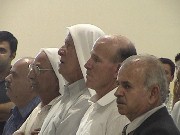 hosting
a bishop quite yet. Fr. Aktham took the role of host, giving the
Melkites the space to shape the service. As such, it was unclear
what role Marthame should play. Firas was insistent that Marthame
be part of the clergy represented up front, since hosting
a bishop quite yet. Fr. Aktham took the role of host, giving the
Melkites the space to shape the service. As such, it was unclear
what role Marthame should play. Firas was insistent that Marthame
be part of the clergy represented up front, since 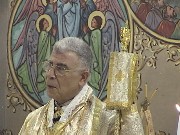 we
have played a part in all of this finally coming to pass, and so told him
to just dress and get up front, with Father Thomas, Father Aktham, and
the Melkite bishop's entourage. When Bishop Ma'alim spoke and gave
his thanks, he also thanked Marthame - and when it came time for the passing
of the peace (in the Melkite church, the priests greet the bishop before
the congregation shares the peace), the Bishop invited Marthame forward
with the others. It was a wonderful moment, exemplifying ecumenism
at its best: Orthodox, Catholic, and Protestant clergy, representing the
three families of Christendom, sharing the peace and celebrating an ordination
together. In a time when the hierarchy is being forced to close many
churches, one is being reopened and a dear friend's gifts for ministry
are being recognized. Marthame was almost in tears. The music of the liturgy
was exquisite, helped by the "ringers" of the bishop's entourage.
Now that Firas is a deacon (he was doubly-ordained today, first to the
office of "Apostolic Deacon" then "Gospel Deacon"), he is able to celebrate
the Melkite mass - all except for the consecration. But since the
Melkites are in communion with Rome, Father Aktham can we
have played a part in all of this finally coming to pass, and so told him
to just dress and get up front, with Father Thomas, Father Aktham, and
the Melkite bishop's entourage. When Bishop Ma'alim spoke and gave
his thanks, he also thanked Marthame - and when it came time for the passing
of the peace (in the Melkite church, the priests greet the bishop before
the congregation shares the peace), the Bishop invited Marthame forward
with the others. It was a wonderful moment, exemplifying ecumenism
at its best: Orthodox, Catholic, and Protestant clergy, representing the
three families of Christendom, sharing the peace and celebrating an ordination
together. In a time when the hierarchy is being forced to close many
churches, one is being reopened and a dear friend's gifts for ministry
are being recognized. Marthame was almost in tears. The music of the liturgy
was exquisite, helped by the "ringers" of the bishop's entourage.
Now that Firas is a deacon (he was doubly-ordained today, first to the
office of "Apostolic Deacon" then "Gospel Deacon"), he is able to celebrate
the Melkite mass - all except for the consecration. But since the
Melkites are in communion with Rome, Father Aktham can 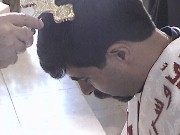 consecrate
host for him so that he can celebrate. His ordained name is Stephen
in honor of his grandfather, the last Melkite priest of Zababdeh.
We then gathered at Firas' - um, Stephen's - parents' house for another
celebratory meal, msakhan, made from bread cooked in olive oil,
then coated with sauteed onions, toasted almonds, and sumac, served with
chicken. Eaten with the hands. A messy, delicious banquet. Firas
has made many friends in his time in Ibillin in the Galilee, among them
a Scottish Presbyterian couple who have become friends of ours. As
the bishop's caravan left for Israel, they stayed behind to visit with
us - we hadn't gotten to see much of them since last April when we spent
a great deal of time in the Galilee, so it was good to reconnect. consecrate
host for him so that he can celebrate. His ordained name is Stephen
in honor of his grandfather, the last Melkite priest of Zababdeh.
We then gathered at Firas' - um, Stephen's - parents' house for another
celebratory meal, msakhan, made from bread cooked in olive oil,
then coated with sauteed onions, toasted almonds, and sumac, served with
chicken. Eaten with the hands. A messy, delicious banquet. Firas
has made many friends in his time in Ibillin in the Galilee, among them
a Scottish Presbyterian couple who have become friends of ours. As
the bishop's caravan left for Israel, they stayed behind to visit with
us - we hadn't gotten to see much of them since last April when we spent
a great deal of time in the Galilee, so it was good to reconnect. |
|
|